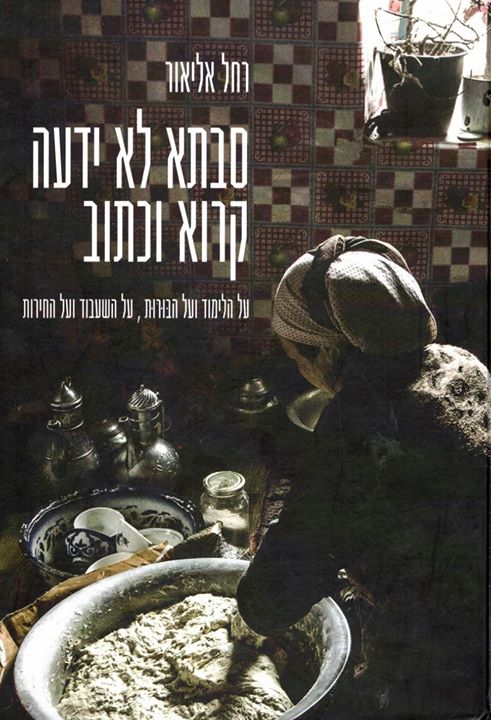Thu 28 March 2019 | 7:00 pm - 9:00 pm
Tolat Sfarim - Kikar Rabin 9, Tel Aviv,

** IN HEBREW **
Bookworm is happy to invite you to the launch of the book
“Grandmother could not read and write”
By Rachel Elior
Carmel Publishing
With:
Dr. Orit Kamir, The Israeli Center for Human Dignity
Prof. Haim Be’er, Ben-Gurion University of the Negev
Prof. Rachel Elior, The Hebrew University of Jerusalem
To be held on Thursday 28 March
Gathering at 19:00
The Book of Mazeh
Mazeh 7 Tel Aviv
Admission is free!
This book deals with the analysis of the meaning of the patriarchal order, which governed the ‘Fathers’ Law which discriminates against women on the basis of ancient myths and divine laws, over society as a whole, from antiquity to the twentieth century. The patriarchal order was based in the Jewish world on the story of the Garden of Eden and on the interpretation of the Sages, who viewed the woman as sinful and guilty since the story of eating the fruit of the Tree of Knowledge, and being punished with eternal punishment: “And he will rule over you” (Genesis 3:16). The discussion focuses on the ways in which Jewish men have their own wives and daughters, in light of the words of Josephus at the end of the first century CE: “The Torah says that the woman is less than the man in everything, and therefore she must listen to him, not for the sake of humiliation, but for the sake of governing her, The power of government. ” Against Apion, 2, p. 201.
The rule of men over women in the traditional world included (a) a sweeping prohibition on women learning the Holy Tongue. (B) A ban on the inheritance of women from family property, the inheritance passed only from fathers to sons. (C) A prohibition to elect and be elected to any community institution. (D) The prohibition against studying and teaching or speaking in public and taking part in any type of leadership, discussion, legislation and law, because exclusive authority was reserved for men only; (d) All girls without sovereignty and without property were obliged to marry in the early second decade of life, Were assigned to them in respect of various jobs in the household and raising the children for the breadwinner. (F) The husband has the right to beat his wife if she has not fulfilled all her obligations to her husband.
The book discusses the exclusivity of male authority in the Jewish people and the significance of the fact that in the library of the 100,000 books of the Jewish people, between the beginning of the printing press and the end of the nineteenth century, not one book written by a Jewish woman in lashon ha’kodesh was printed in her lifetime. There is no connection of a Jewish woman in print or handwriting, in Hebrew, which was published as a book and was recognized and honored before the twentieth century.
The book focuses on investigating the cultural, legal and legal justifications for discrimination and enslavement, exclusion, exclusion, suppression, oppression, dependence and violence against women, as expressed throughout the history of Israel and the nations of the world. The discussion deals with the investigation of the claims of men who believed that “God gave the man the authority to rule,” against women, and in examining the legal steps they took with respect to their daughters and wives. The book presents testimonies of women who lived in the patriarchal world about their bitter life experience and signed up in a collection of unknown literary testimonies about women writing and reading from the ancient to the nineteenth century.
Check Out The Event Page On Facebook
